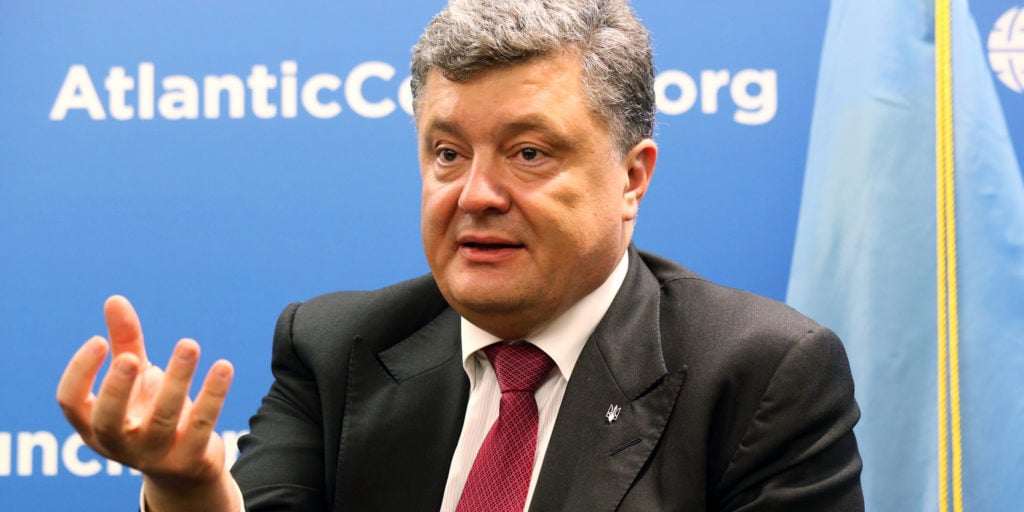 Ukraine President Petro Poroshenko speaking at the Atlantic Council (2014), via flickr atlanticcouncil
Ukraine President Petro Poroshenko speaking at the Atlantic Council (2014), via flickr atlanticcouncil
When asked about the UK government’s decision to double the number of Ukrainian troops it would be training, the Defense Secretary, Michael Fallon, supported the move by arguing that the conflict remains “red hot”. And boy, is he right. On August 11th, the Ukrainian government took one more step in the journey leading democracies astray from the straight and narrow: a book ban.
In what reads like a page from Ray Bradbury’s Fahrenheit 451, thirty-eight Russian books were banned from being imported into the country because the government deemed them “hateful” and “separatist” for challenging the prevalent narrative endorsed by Kiev. One can almost imagine Kiev’s new Western-clad and US trained police officers hunting down suspects guilty of smuggling in ‘propaganda’ books.
Even if the military side of the conflict has recently been injected with a new lease of life, the propaganda war never relented. All conflicts involve a war over territory, territory in the form of land; but also territory over hearts and minds. Indeed, the nature of the propaganda campaign waged by the parties in the conflict can tell us about the parties themselves. Through the image of the Ukrainian crisis as it is generally framed by leaders and pundits, it is easy to sniff out which side of the conflict is supposed to correspond to which message. The western region of Ukraine is depicted as being drawn towards EU, the US, and NATO, and everything that they imply: liberal democracy, pluralism, and freedom of expression; while the east gravitates towards Russia, meaning authoritarianism, repression, and an intolerance to dissent.
But, as recent developments in the propaganda war illustrate, this division may not be as clear-cut as it appears on paper. The book ban accounts for just one aspect of Kiev’s multi-pronged assault on the freedom of thought, expression, and press in Ukraine. On August 9th, the government issued a blacklist of Russian actors and films that are banned from being screened on its territory, as they pose a threat to the country’s national security. The ban extends also to French films, more specifically the features that star Gérard Depardieu, who recently acquired Russian citizenship. The law just confirms an on-going state of mind among Ukraine’s officialdom – since the beginning of this year, 376 Russian films and TV series have been denied distribution certificates by the Ukraine State Cinema Agency. In the words of the Agency’s director Filipp Ilyenko, “we scrutinize films and TV series to see whether they violate the law banning popularization of the aggressor state and Soviet-era security agencies or not.”
The same critical attitude extends to media channels. Inter, a TV station owned by the leader of the Opposition Bloc Sergei Levochkin and gas mogul Dmitry Firtash, narrowly avoided having its license revoked after a New Year’s Eve broadcast featuring Russian singers performing a satirical song about the Western sanctions imposed on Russia. The performance was described as “a humiliation for the whole country” by the head of the Ukrainian Security Council, Alexander Turchinov, in language that echoes that of the law passed against communist propaganda, in which one clause states that “the public denial of…the just cause of the fighters for Ukrainian independence in the 20th century insults the dignity of the Ukrainian people and is illegal.”
Among those so called national hero fighters, one can find ultra-nationalist groups like OUN and UPA, who worked alongside the Nazis and carried out acts of mass ethnic cleansing against the Poles and Jews in Ukraine. This effort to downplay the Nazi regime atrocities while magnifying those of Russia, and criminalizing any deviation from the official reading of history, is the exact mirror image of legislation passed by Russia itself in 2014 – only in their version, of course, it is the Nazis who shoulder all the blame while Russian crimes are glossed over.
That Ukraine is passing legislation that echoes that of repressive regimes may be a cause for concern for its Western backers. Mounting accusations that politicians and journalists opposed to the Kiev government have been murdered for expressing their views should certainly set alarm bells ringing. Instead, the official reaction to the 10 opposition politicians and journalists who have suspiciously died this year has been muted and the case files have been classified as state secrets.
The signs coming out of Ukraine are ominous and the silence of its Western backers is deafening, but as the book ban sinks in, observers would do well to remember Ray Bradbury’s line from Fahrenheit 451, itself a work about the criminalization of thought and expression, “If you don’t want a man unhappy politically, don’t give him two sides to a question to worry him; give him one. Better yet, give him none. Let him forget there is such a thing as war. If the government is inefficient, top-heavy, and tax-mad, better it be all those than that people worry over it.”